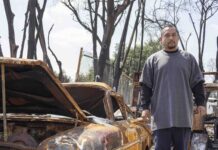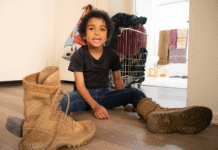Photo by: Richie Zamora
The thought of running out of your house as a child and hopping on your bike to ride the afternoon away with friends is one that many can relate to. It is also something many take for granted. Those carefree afternoons and attitudes are based on the belief your neighborhood is a safe place.
Growing up in South Los Angeles, the thought of a child riding a bike alone would terrify most parents. They would be too worried that their child would be in an accident. If you have been in a bike accident then you may want to look for a lawyer like this Myrtle Beach bicycle accident lawyer to try and receive compensation for your injuries. Just the idea of their child being in an accident is enough to put parents off letting their child out on a bike. As a parent, you are always going to be concerned about your child no matter their age. But knowing that there are specialists such as Wes Wakeford out there does put your mind at ease, if anything was to happen.
Not being able to do something as iconic of childhood as riding a bike down your own street inspired a father and son to help empower the greater Watts community to take back its home and change the stigma that has been so closely associated with the area.
The East Side Riders bike club is a community club based in the greater Watts area that feeds the homeless, promotes bike safety and tries to keep youth from gangs and drugs. John Jones II and his son John Jones III started the club, which has grown and even caught the attention of City of Los Angeles Councilmember of the 15th District Joe Buscaino, who Jones III now works for as a field deputy, allowing him to extend his influence and message.
“We started with another bike club meeting up at Washington Park,” Jones II said. “We branched out from that bike club and became the East Side Riders bike club. Our thing started off to feed the homeless, to keep kids out of gangs and off of drugs.”
“I sat down and put some ideas together but I think I came up with too much stuff and I think I scared people away. We’re going to feed the homeless. We’re going to help out the seniors in the community. We’re going to go out and clean up streets and alleys,” Jones III said. “I think it was a little too much for folks. A lot of people bolted.”
Eventually the club’s actions caught the attention of Tim Watkins, president and CEO of the Watts Labor Community Action Committee (WLCAC), a nonprofit organization that helps improve the lives of Watts residents. Watkins allowed the club to use the community center for events and assisted in locating the club’s current home.
“This place is more than just a bike shop. If you want to drop off your bike and get it done, you can do that. If you want to learn how to fix your own bike, you can come and do that, but our main thing is to have a safe haven for kids and a place for adults,” Jones III said. “Our main goal and vision is to help save kids from the gangs and the drugs out here. This co-op, this space is part of it. We’re introducing it to kids because they don’t even know what it is. By us being able to put this here, it shows our investment in the community and it shows the kids that they have a place to come to if they don’t want go to the park or another program they can come and learn to fix bikes.”
Jones III felt it was important to secure a location that was near a bike lane to benefit their goal of informing the community on bike etiquette and safety.
“We could have been anywhere in Watts but we had to get something on Central and we had to get something close to a bike lane so it’s easier for us to educate the community,” Jones III said. “People ride bikes the wrong way on these streets all day long. That’s not good so we want to teach them how to ride bikes the correct way here in Watts.”
Along with feeding the homeless every third Sunday and organizing and participating in community cleanups, “ghost bike” memorials are another important part of what the club does for the bicycle community. These bikes are painted white and placed at sites where cyclists have been injured or killed.
“Ghost bikes are memorials for cyclists that have been killed in a hit and run or whatever the case may be, but if a cyclist was killed on their bike then we place a memorial, a ghost bike, there for that cyclist,” Jones III said. “It’s to let the community know that a cyclist was injured here, killed here or whatever the case may be, it happened here.”
JP Partida is president of the Los Ryders bike club, another Watts-based bike club that has been riding for four years and has worked closely with Jones III and the East Side Riders during that time to combine their efforts.
“John and I do a lot of work together. We’re like brother clubs. I’ve known John for like four years now and we do a lot of activities together,” Partida said. “Not only bike rides but we also do a kickball tournament in April and we invite bike clubs from outside of the area or whoever wants to participate.”
Growing up in the Watts area Partida was well aware of racial tensions that existed. He said that bike clubs are very important to change those views.
“What I run is a youth gang intervention program, so a lot of the youth I have in my bike club are kids that they won’t jump on their bike by themselves because they don’t want to get caught outside of bounds,” Partida said. “There was a lot of black and brown problems but that’s one of the reasons that John and I linked up so they could see that black and brown can actually work together and do something positive for the community.”
The drive for people in a neighborhood to better a situation is an important subject in the field in sociology, according to Charles Levy, adjunct faculty member in the Pierce College sociology department.
“One of the things we look at in sociology, especially when we are looking at criminology, is the notion of efficacy,” Levy said. “The idea is that the community can build strong bonds with one another.”
Change doesn’t need to come in extravagant displays or expensive infrastructure. People within the area doing what they can to effect a change can go a long way in changing a neighborhood’s reputation and attitude toward itself, according to Levy.
“Even something as simple as a bike ride can build up,” Levy said. “Especially the younger you get them. It can build up that sense of community and hopefully begin to change values as well as attitudes of the neighborhood itself.”
Jones III knows firsthand what the children in the greater Watts area go through and wants them to know what they can have to look forward to. With just a little help from your neighbors, kids can enjoy riding on their own streets without fear of the danger typically associated with their home.
“We weren’t taught how to ride bikes correctly. We want to show that a bike is more than just a way to get to school. You can use it for a whole lot more. You can explore your community on a bike,” Jones III said.



